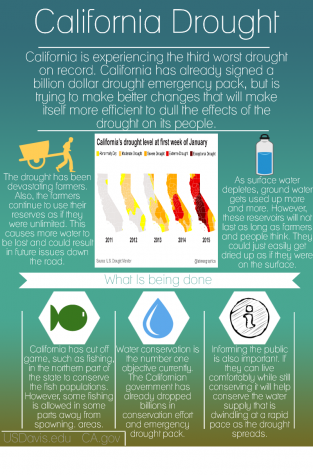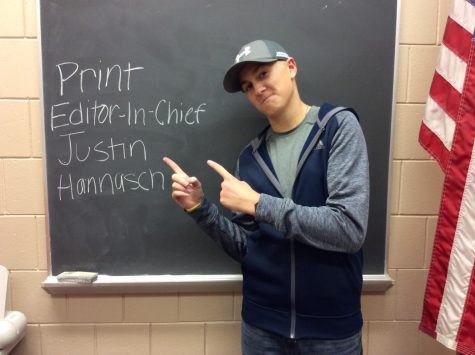California drought leads to controversy with Nestlé
April 30, 2015

California is currently in one of the worst droughts the United States has ever seen. According to TheHill.com, “Government estimates tell California Gov. Jerry Brown (D) it will take 11 trillion gallons of water to end the historic drought in his state.” With California in such a drought, water prices have gone up and even the water supply is staggering low. Shelves and shelves of water bottles that people in Minnesota see every day at Target or Cub, are not the same in California. With this drought, many people and companies are taking hits. Nestlé is not one of those companies.
The company Nestlé is known for making popular products such as Hot Pockets, Baby Ruth candy bars, Juicy Juice, Nesquik and Nestlé Crunch bars. One of Nestlé’s highest grossing products, though, is their Nestlé Pure Life water bottles. Nestlé actually owns over 70 water bottle companies throughout the world, including 29 facilities in the U.S. and Canada. These bottles, a popular water choice for many, have recently become a hot topic.
Nestlé gets much of their water supply from California, a majority of that from springs that are right where the drought is hitting the hardest. People in California are protesting this as being wrong and over 150,000 people have signed an online petition to stop Nestlé. A group of protestors in California are saying Nestlé is taking advantage of California’s supply of water.
Junior Wyatt Miller said, “What Nestlé is doing isn’t right because, since the prices of water have gone up in California, as well as [California] isn’t able to actually obtain it, a big company like Nestlé shouldn’t be able to get their hands on it first.”
The battle between protestors and Nestlé is a tough one because what Nestlé is doing is in fact 100 percent legal. They are not violating any laws or doing anything illegal. On top of that, according to ABC.com, a spokeswoman for Nestlé stated, “Nestlé uses less than 1 percent of available water in the state of California.”
“In my opinion, business is business and if that’s what [Nestlé] needs to do to keep making money, so be it. Yes it’s wrong, but through a business stand point, I understand it,” said junior Cannon Braatz.
If Nestlé did decide to get water from somewhere else, there are many alternative ways on what Nestlé could do. One idea is said by junior Marissa Matchey. She said, “If I were Nestlé, I would stop getting water from California and sell it for a cheaper price in that state to help out.”
“One idea is Nestlé could talk with the government of California to come up with an agreement over where Nestlé should get their water, or if they would be able to continue their supply from California,” said junior Wyatt Larson.
For Nestlé, they will have a tough choice ahead of them. From a business stand point, how they are currently getting their water supply is legal and making money, but on the other hand, it is morally ethical to stop taking water from California at such a hard time. Whatever Nestlé decides to do, the whole nation and especially California, will be watching anxiously.










Dan Justesen • May 12, 2015 at 8:53 pm
I liked all the different perspectives in the article! This is a very good topic to debate about it creates many different opinions. The infographic is great and it was very detailed. The infographic really opens up the article and allows you to have an opinion.